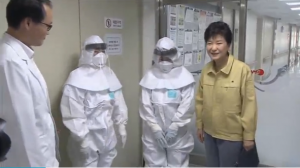
JUNE 5 (Reuters) — South Korean President Park Geun-hye visited the National Medical Center in Seoul on Friday (June 5) where Middle East Respiratory Syndrome (MERS) patients are being hospitalized.
The government has promised to do everything it can to end the outbreak which began in South Korea last month when an infected South Korean man brought it back from a business trip to the Middle East.
Park met medical workers who wore personal protected equipment in front of State-designated quarantine wards.
“People should trust that the government is trying its best with civilian experts to prevent the spread of disease in every possible way,” South Korean President Park Geun-hye told officials after touring the quarantine hospital.
South Korean Ministry of Health and Welfare confirmed the death of one more victim of Middle East Respiratory Syndrome (MERS) on Friday, the fourth fatality in an outbreak of the often-deadly virus in the country.
The ministry said five more people were confirmed to be carrying the disease, bringing the total of South Koreans with MERS to 41 — the highest number outside the Middle East.
Seven confirmed MERS cases have been cured at isolation wards in National Medical Center. One among them is the wife of the first patient was discharged from the hospital on Friday afternoon, President of National Medical Center Ahn Myoung-ock said.
The first patient was diagnosed on May 20 after a trip to Bahrain, Saudi Arabia and the United Arab Emirates.
More than 3,000 people have been advised to stay at home in voluntary quarantine or have been quarantined at medical facilities.
Whilst there has been no sustained human-to-human transmission, the worst-case scenario would be for the virus to change and spread rapidly, as Severe Acute Respiratory Syndrome (SARS) did in 2002-2003, killing about 800 people around the world.
MERS was first identified in humans in 2012 and is caused by a coronavirus from the same family as the one that triggered SARS. However, MERS has a much higher death rate at 38 percent, according to WHO figures, but it does not spread as easily as SARS.







